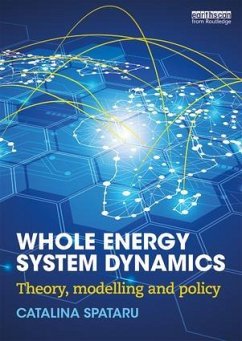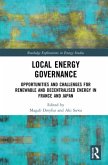In order to address the twenty-first-century challenges of decarbonisation, energy security and cost-effectiveness it is essential to understand whole energy systems and the interconnection and interaction between different components. An integrated language is therefore needed to assist energy policymakers and to help industrial stakeholders assess future energy systems and infrastructure and make realistic technical and economic decisions.
Whole Energy System Dynamics provides an interdisciplinary approach to whole energy systems; providing insights and understanding of it in the context of challenges, opportunities and solutions at different levels and time steps. It discusses approaches across disciplinary boundaries as well as existing issues within three main themes: theory, modelling and policy, and their interlinkage with geopolitics, markets and practice. Spataru argues that there is an urgent need for a whole energy system integration. This is necessary for effective analysis, design and control of the interactions and interdependencies involved in the technical, economic, regulatory and social dimensions of the energy system.
This book is essential reading for students interested in the area of energy systems, policy and modelling. It is also a valuable read for policymakers, professionals, researchers, academics, engineers and industrial stakeholders.
Whole Energy System Dynamics provides an interdisciplinary approach to whole energy systems; providing insights and understanding of it in the context of challenges, opportunities and solutions at different levels and time steps. It discusses approaches across disciplinary boundaries as well as existing issues within three main themes: theory, modelling and policy, and their interlinkage with geopolitics, markets and practice. Spataru argues that there is an urgent need for a whole energy system integration. This is necessary for effective analysis, design and control of the interactions and interdependencies involved in the technical, economic, regulatory and social dimensions of the energy system.
This book is essential reading for students interested in the area of energy systems, policy and modelling. It is also a valuable read for policymakers, professionals, researchers, academics, engineers and industrial stakeholders.
"Whole Energy System Dynamics provides a genuine means of understanding the energy system by identifying three main pillars: the theory of interacting systems, the practice of modelling the whole energy system and the policy that steers its future evolution. The book rises to the challenge of integrating the numerous parts of today's energy systems while connecting the different disciplines and thus allowing for various perspectives on the complex systems we are all part of." - Andreas Koch, Group Manager Energy Planning and Geosimulation, EIFER I European Institute for Energy Research, Germany
"This book comes at a time when there is an urgent need to have a complete rethink of our future energy options. It cuts through the ingrained perceptions hindering our move from fossil fuel to sustainable forms of energy. This book, which integrates theory, practical perspectives, modelling and policy aspects and links traditional engineering ways with the very latest developments, will be a beacon in our quest for a secure and sustainable energy future." - Trevor Letcher, Emeritus Professor of Chemistry at the University of KwaZulu-Natal, Durban, South Africa and a Fellow of the Royal Society of Chemistry.
"This book is well written, hugely interesting and an excellent format for discussing new problems, particularly for people working on energy systems and policy. It provides profound analysis and understanding of the energy systems integration from theory, practice/modelling and policy perspectives as a whole. I enjoyed reading it." - Pierluigi Siano, Professor of Electrical Energy Engineering, Electrical Power Systems, University of Salerno, Italy
"The book is very timely as whole system energy modelling is one of the hottest research topics at the moment. Research funding agencies in many countries have recognized the need to research and model the energy system as the whole and provided ample funding to support it. This is a relatively new area of research and there are few books available on the subject. This book therefore fills an important gap in the market by covering theory, practice and policy. It will be relevant not only for researchers but also for policy makers." - Janusz Bialek, FIEEE, Director of Skoltech Center for Energy Systems, Russia
"This book comes at a time when there is an urgent need to have a complete rethink of our future energy options. It cuts through the ingrained perceptions hindering our move from fossil fuel to sustainable forms of energy. This book, which integrates theory, practical perspectives, modelling and policy aspects and links traditional engineering ways with the very latest developments, will be a beacon in our quest for a secure and sustainable energy future." - Trevor Letcher, Emeritus Professor of Chemistry at the University of KwaZulu-Natal, Durban, South Africa and a Fellow of the Royal Society of Chemistry.
"This book is well written, hugely interesting and an excellent format for discussing new problems, particularly for people working on energy systems and policy. It provides profound analysis and understanding of the energy systems integration from theory, practice/modelling and policy perspectives as a whole. I enjoyed reading it." - Pierluigi Siano, Professor of Electrical Energy Engineering, Electrical Power Systems, University of Salerno, Italy
"The book is very timely as whole system energy modelling is one of the hottest research topics at the moment. Research funding agencies in many countries have recognized the need to research and model the energy system as the whole and provided ample funding to support it. This is a relatively new area of research and there are few books available on the subject. This book therefore fills an important gap in the market by covering theory, practice and policy. It will be relevant not only for researchers but also for policy makers." - Janusz Bialek, FIEEE, Director of Skoltech Center for Energy Systems, Russia








